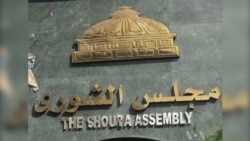CAIRO —
Egypt’s constitution is being rewritten by a small group appointed by the military-backed government, overhauling the previous, Islamist-driven charter. This will be the country’s fourth constitution in less than three years.
A 50-member committee is overseeing what's meant to be the first step of a “roadmap” to reshape Egypt's government following the July ousting of the country's first freely-elected president, Islamist Mohamed Morsi.
Morsi pushed through last year's charter, written mainly by Islamists, using extraordinary powers. The move sparked a wave of popular unrest and marked the beginning of his political decline.
For Morsi’s opponents, the potential for improving on the previous charter is vast.
“The constitution of the Muslim Brotherhood was, in my opinion, violating social and civil rights of the Egyptians. They tried to educate and re-educate Egyptians how to behave,” said Mustafa Labbad, the director of the Al Sharq Center for Regional and Strategic Studies.
Foremost among critics’ objections was what was perceived as an attempt to Islamize Egypt. The new draft, being drawn up by a group with noticeably few Islamists, promises to lift longstanding restrictions on Christian churches, but seems likely to retain overall limits on religious beliefs.
Political sociologist Said Sadek of the American University in Cairo said he wishes the country could move beyond recognizing only the Abrahamic faiths.
“It would have given the signal that Egypt is modern, into the 21st century, [that] it does not discriminate against 51 percent of the world's population who don't believe in Christianity, Islam and Judaism,” said Sadek.
Committee members are also tackling the other major issue in Egyptian politics today - the role of the military and the balance of power among branches of government.
Few of the members have raised questions about the military's attempt to put protections for itself into the new constitution. Labbad is not surprised.
“Military institutions will be the dominant force in the upcoming political system and we have to confess, since at least 200 years [ago], Egyptian military institutions [have been] controlling the country,” said Labbad,
There are hints, however, that some dynamics may shift. The group has already decided to abolish the upper house of parliament; additionally, it appears to favor a greater division of responsibilities between the president and the prime minister.
For a country that has undergone profound changes in recent years, some feel an imperfect document, even if again drafted quickly by a small and not fully representative group, may be enough for now.
“We hope that this constitution becomes interim, [that] it is not going to be permanent, [that] it is going to stay some time until things improve, until there is lower illiteracy rate, lower poverty rate,” explained Sadek.
The final draft is expected to be put to a public referendum next month, clearing the way for parliamentary and presidential elections next year.
A 50-member committee is overseeing what's meant to be the first step of a “roadmap” to reshape Egypt's government following the July ousting of the country's first freely-elected president, Islamist Mohamed Morsi.
Morsi pushed through last year's charter, written mainly by Islamists, using extraordinary powers. The move sparked a wave of popular unrest and marked the beginning of his political decline.
For Morsi’s opponents, the potential for improving on the previous charter is vast.
“The constitution of the Muslim Brotherhood was, in my opinion, violating social and civil rights of the Egyptians. They tried to educate and re-educate Egyptians how to behave,” said Mustafa Labbad, the director of the Al Sharq Center for Regional and Strategic Studies.
Foremost among critics’ objections was what was perceived as an attempt to Islamize Egypt. The new draft, being drawn up by a group with noticeably few Islamists, promises to lift longstanding restrictions on Christian churches, but seems likely to retain overall limits on religious beliefs.
Political sociologist Said Sadek of the American University in Cairo said he wishes the country could move beyond recognizing only the Abrahamic faiths.
“It would have given the signal that Egypt is modern, into the 21st century, [that] it does not discriminate against 51 percent of the world's population who don't believe in Christianity, Islam and Judaism,” said Sadek.
Committee members are also tackling the other major issue in Egyptian politics today - the role of the military and the balance of power among branches of government.
Few of the members have raised questions about the military's attempt to put protections for itself into the new constitution. Labbad is not surprised.
“Military institutions will be the dominant force in the upcoming political system and we have to confess, since at least 200 years [ago], Egyptian military institutions [have been] controlling the country,” said Labbad,
There are hints, however, that some dynamics may shift. The group has already decided to abolish the upper house of parliament; additionally, it appears to favor a greater division of responsibilities between the president and the prime minister.
For a country that has undergone profound changes in recent years, some feel an imperfect document, even if again drafted quickly by a small and not fully representative group, may be enough for now.
“We hope that this constitution becomes interim, [that] it is not going to be permanent, [that] it is going to stay some time until things improve, until there is lower illiteracy rate, lower poverty rate,” explained Sadek.
The final draft is expected to be put to a public referendum next month, clearing the way for parliamentary and presidential elections next year.














